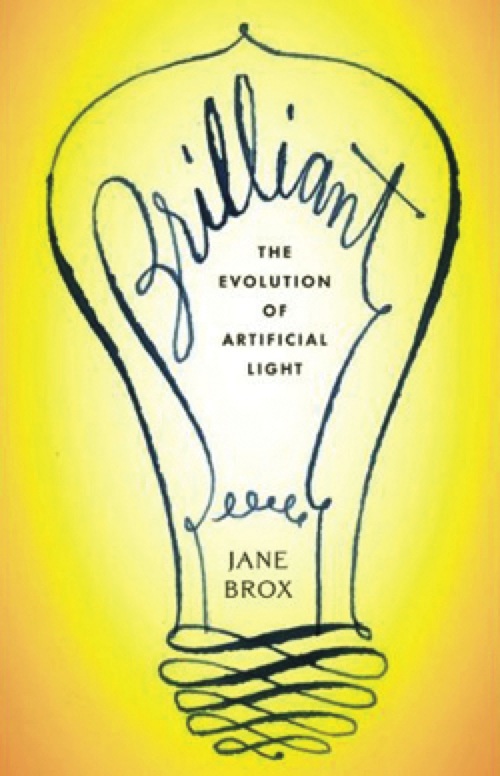It’s late. I have to finish this review before morning. Stumbling into my office, I switch on the light (and the computer and the printer and the fax machine). They spring to life — no big deal.
It wasn’t always thus. To take only the most venerable of the above devices, it is more than likely that electric light would have been unavailable to me a mere century ago. According to Jane Brox, at that time, only 16 percent of American homes were connected to an electric power station. How our species got to that point and the progress we have made since is the subject of her new book, “Brilliant.”
Brox starts in the Pleistocene, specifically in the Lascaux caves, where man’s ability to conjure a flame fed on tallow gave the world its first great art. Her tale winds through classical antiquity to the Middle Ages and the Belle Epoque. Tallow, then whale oil, then gaslight, then kerosene: One by one they exerted an influence on our way of life.
Brox makes a particular point of how human society was transformed by each discovery. Thus, “the kerosene lamp was the apotheosis of the tallow cupped in limestone at Lascaux, the last self-tended flame.” Gaslight, with its necessary mains, had already “divided light — and life — from its singular, self-reliant past. All was now interconnected, contingent, and intricate.” And as she continues the story into the age of electricity, “people everywhere would have to come to terms with living with the inexplicable.”
As well as articulating grand themes, Brox has digested a lot of research on all manner of inventions designed through the ages to produce light. She is not shy with statistics, relating how many pounds of candle wax lasted how long, how the intensity of artificial light rose while its costs declined in the nineteenth century, and the rate of domestic electrification.
Brox also delights in fascinating facts. Eighteenth-century colliers worked by the light of rotting fish. Before it was banned, oil from the sperm whale was used as lubrication in the instrument panels on rocket ships. And my favorite: In the early days, electric power companies stationed workers on tall buildings to warn of approaching storms, since darkened skies meant lights turning on. At a word from the watchers, the generators would be stoked and ready for the surge.
Her own narrative is salted with revealing quotes and references going back to the beginnings of history. Voices from a different past add immeasurably to our view. However, fellow commentators from our own times, for the most part, lack the spark of Brox’s prose. I sometimes wished she had been less punctilious with her quotations and instead credited her sources while summarizing their information in her own clear voice.
Brox is exceptionally good at finding little things from everyday life, archetypal in their triviality, to drive home a larger, less tangible point or allow the reader to identify with an era or a time of day. Of household light in medieval times: “Within, candles and lamps lit only a bowl of porridge, a book, a shirtsleeve in need of mending, another.” Leading up to the Great Blackout of 1965: “In small towns, stores flipped over their Open signs and closed up shop.” Sometimes, her similes have no larger purpose than poetic exuberance. On the map of the world at night: “Light blooms across the continents like yeast in warm, sweet water.”
Every so often, the author finds a painting — a Vermeer or Van Gogh or Hopper — that can explicate her theme. They are nicely described, but how much nicer if they also were reproduced on the page? Beyond art, the story told in “Brilliant” has so many opportunities for interesting pictures that it is a pity the publisher elected to leave it unillustrated.
With an all-encompassing subject like “the evolution of artificial light,” the temptation must be overwhelming to include a good story even if it spins out of the narrative’s orbit. It is hard to criticize “Brilliant” in this regard, not because of self-restraint on the author’s part but because she makes the reader such a willing co-explorer. However, when she gets to the present era, the writing flags. Halfway through an account of the 1973 oil embargo and President Carter’s “moral equivalent of war,” I felt her inimitable freshness succumbing to the gray tones of envirospeak.
Obviously extinction and climate change and nifty new technology are important parts of tomorrow’s story, but its uncharacteristic lack of focus suggested the chapter had been written so the publisher’s press release could call it “timely.” A writer of Jane Brox’s class doesn’t need to be up-to-the minute to inspire. Her persuasive prose is more than enough. At its best, “Brilliant” is, well, brilliant.
Thomas Urquhart is the former director of Maine Audubon and author of “For the Beauty of the Earth.”
Send questions/comments to the editors.


